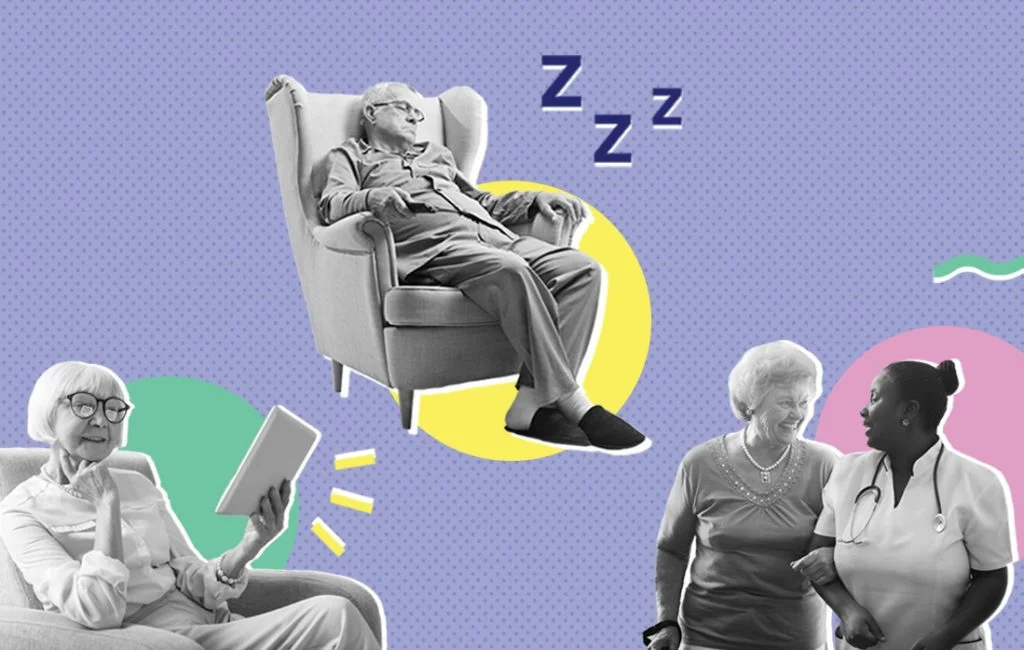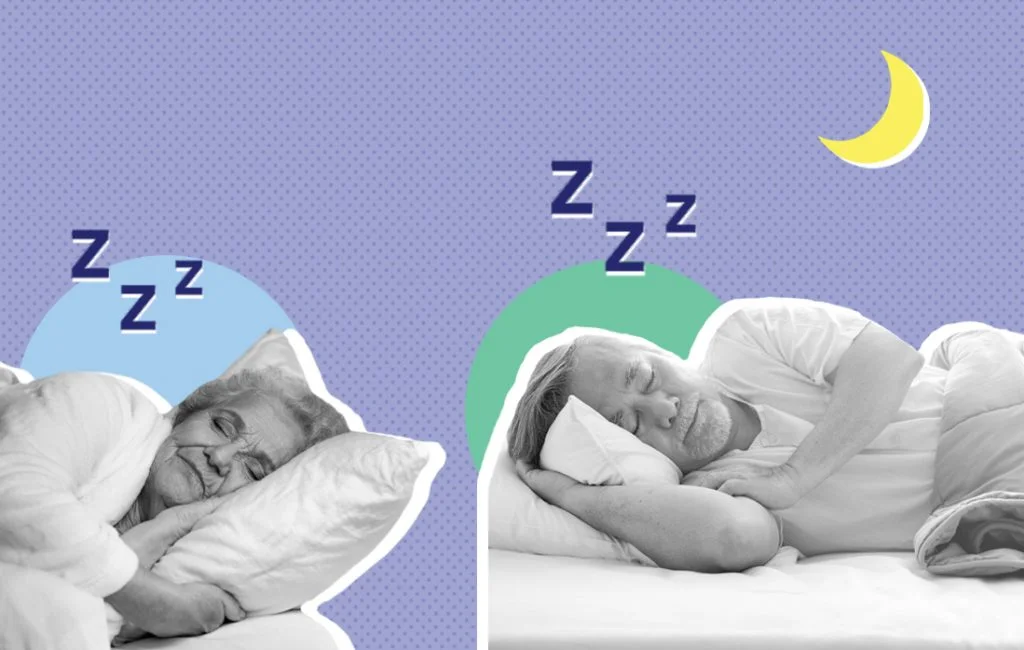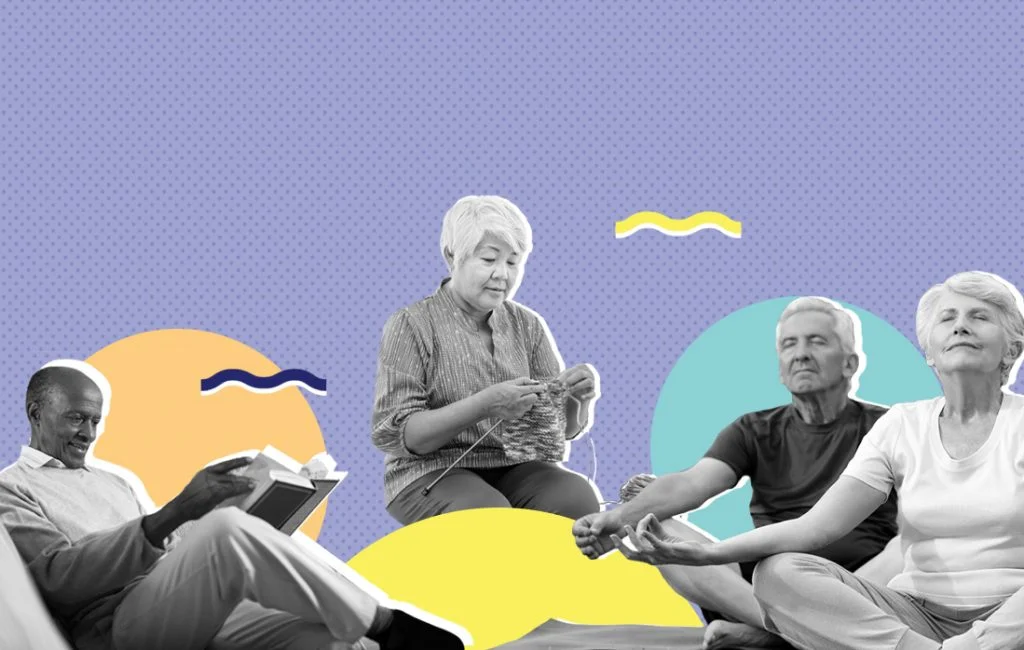Nursing homes can contribute to sleep difficulties among residents. If you currently have or will have a loved one in a nursing home, you may be wondering how their sleep is/will be affected. According to a 2018 study in the International Journal of Older People Nursing, “Sleep problems are much more prevalent in nursing home residents than in their community‐dwelling counterparts.” (1)
In this article, I’ll discuss how sleep is affected in seniors, specifically those in nursing homes. I’ll also offer some guidance from healthcare experts on how to counteract a few of the negative sleep impacts seniors in nursing homes face.
Before we get started, I’d like to note that I’m not a medical professional, and serious sleep issues should be assessed and treated by a doctor. I do, however, hope that the information in this article will help you find solutions to any sleep problems your loved one may experience in a nursing home.
Seniors and Sleep
As we age, the way we sleep changes. A 2012 Brazilian study in Acta Paulista de Enfermagem explained the aging process may negatively affect a person’s sleep, making seniors more prone to having poor sleep. This is especially true in regards to seniors in nursing homes. (2)
To determine how to define poor sleep in older adults, I consulted a 2011 study in the Handbook of Clinical Neurology that surveyed older adults’ sleep patterns. The following points the study provided were particularly useful:
- Poor sleep is defined as anything less than 7 hours in order to function as healthy as possible.
- Patients with dementia generally have disturbed sleep. (3)
However, Dr. Christina Pierpaoli Parker, Ph.D., a postdoctoral fellow of adult and geriatric behavioral sleep medicine at the University of Alabama at Birmingham, cautions that, “total sleep need varies within and across people. While the recommended daily “dose” of sleep for people 65+ falls between 7-8 hours, some people may require more or less. So, consider this recommendation a flexible guideline, not a rigid prescription. Individuals’ sleep time needs vary considerably.”
Additionally, defining poor sleep goes beyond objective indices such as total sleep time, sleep onset, number of awakenings etc. and must include subjective measures of psychological distress, (un)wellness and impairment, such as mood, cognition, as well as daytime fatigue and functioning. (4)
While many seniors will have to contend with sleep issues as they get older, unfortunately, seniors sleeping in nursing homes can introduce additional environmental barriers to getting good sleep.
Sleeping in a Nursing Home
To learn more about how sleep affects seniors who are specifically in nursing homes, I spoke with Dr. Patricia Celan, Psychiatry Resident at Dalhousie University in Canada.
“Typically, food and activities are offered on a restricted schedule,” she noted, “meaning that seniors must adhere to a sleeping schedule that may not be what they have been used to, with the disruption in their usual pattern resulting in insomnia and fatigue.” Dr. Parker adds that a restricted schedule can result in a sleep schedule that does not align with the resident’s chronotype — or their propensity to sleep at a particular time during a 24-hour period.
“Imposing a bedtime or attempting to initiate sleep among residents who may not feel sleepy increases their odds of spending time awake in bed,” Dr. Parker explained. “Over time, staying awake in bed attempting to fall or stay asleep can transform the bed into a cue for wakefulness rather than for sleep among residents, thereby perpetuating insomnia symptoms.”

In addition, each patient will have their own care times (medication, bathing, etc.), which can affect their sleep schedules. According to a 2011 Ageing and Society paper that interviewed 38 residents in 6 different nursing homes, there was little choice residents often had regarding the bedtimes the nursing home assigned them. The paper also asserted that the shifts of staff influenced residents’ bedtimes. (5) Talking with your loved one’s nursing home staff may help with this, which we’ll discuss later in this article.
In order to find out more about the impact of sleep on seniors in nursing homes, I talked to Amie Clark, co-founder and senior editor of TheSeniorList. A former Long-Term Care Ombudsman who worked in skilled nursing facilities, Clark has since starter her own company that specializes in geriatric care management and senior housing advice. She noted that, “Good sleep can definitely be a challenge for residents in nursing homes,” and pointed to a few stimuli that can be particularly problematic, including:
- Alarms
- Equipment noise
- Potential interruption from roommates, since many nursing home rooms are shared
- Caregivers taking vital signs of dispensing medications throughout the night
- Uncomfortable beds
Tips for Improving Sleep in Nursing Homes
Though nursing home residents face several obstacles when it comes to their sleep, there are ways to mitigate these issues. I received the following tips after speaking with multiple health experts:
Increase exercise during the day.
Ben Tanner, PA of FastingWell.com recommends residents exercise daily, being sure to do so at least two to three hours before bedtime. Sleep pressure, or the body’s “hunger” for sleep, accumulates with increasing time spent awake and dissipates with the opportunities to sleep. Vigorous, moderate, or even mild daytime energy expenditure in the form of walking, swimming, gardening, or even bowling can stimulate something called adenosine, which builds sleep pressure. Daytime energy expenditure means more sleep pressure and, usually, better, deeper sleep.
- Jocelyn Nadua, Registered Practical Nurse and Care Coordinator at C-Care Health Services suggests “30 to 40 minutes of exercise sessions, especially aerobic activities, to release chemicals that facilitate restful sleep.” She notes several types of exercises, which may or may not be realistic for your loved one, stating that, “dance, swim and water exercises, golf, running, cycling, and lawn bowling are all beneficial, but consult your physician before trying a new fitness program.”
- Dr. Parker further explains the importance of residents picking physical activities that they can do and like to do, because, otherwise, they will likely disengage and not reap the physical or sleep benefits. She says, “Movement can and should take many forms — such as walking, tai chi, or chair yoga (all of which can yield cognitive, physical, and psychological benefits).
Schedule and engage in pleasant events.
Engaging in pleasant events or scheduled pleasurable activities such as crafting, reading, or listening to music may also improve sleep quality via reduced depressive symptoms. (6) Identifying and tailoring meaningful pleasant activities to the resident can maximize sleep and related psychiatric and physical health outcomes.
Maximize light exposure during the day but reduce it at night.
External and endogenous cues known as zeitgebers, a German word meaning “time givers,” work to synchronize our biological clock. In humans, darkness promotes sleep, light promotes wakefulness. Darkness promotes the production of melatonin, a primary drowsiness-promoting hormone, light interrupts it. Light signals sent from the eye to the brain help to regulate our biological rhythms. Sunlight plays a big role, but light emitted from artificial sources (e.g. smartphones, computers) can also impact our circadian system.
- Exposing residents to natural sunlight upon waking and throughout the day (which cues the body into wakefulness) and reducing face time with light and light-emitting devices 1-2 hours before bed (which cues the body into sleep) can optimize sleep for nursing home residents.
- Jennifer Geren, Ph.D., a Clinical Geropsychologist and Neuropsychologist at Executive Mental Health, suggests that using eye masks can help with any disturbing lights at night.
- Mr. Tanner recommends keeping the bedroom dark and as free of as many distractions as possible, which includes turning digital clocks around or placing a piece of tape over them.
Reduce sounds at night.
To keep sounds down to a minimum, Dr. Geren suggests using sound machines, earplugs, or headphones (both for the resident and their roommate).
Make the temperature comfortable.
Dr. Parker explained the importance of setting and maintaining a resident’s ideal room temperature to help them sleep more comfortably throughout the night. Like light, core body temperature also works to synchronize our circadian rhythm, commonly known as our internal clock. A nocturnal decline in core body temperature by 2-3 degrees Fahrenheit helps to initiate and maintain sleep. Sleeping cool helps to hasten the body’s sleep onset — or the time it needs to fall asleep — and to stay asleep so residents can cycle through the deepest stages of sleep.
- Keeping residents’ rooms dark and cool, typically between 62 – 70F (though still debated), can facilitate this.
- Some emerging evidence also suggests that passive body heating via a bath or shower 60 to 120 minutes before bed can hasten sleep onset because it reduces core body temperature, a thermoregulatory process necessary for sleep. (7) While it may sound counterintuitive, passive body heating elicits heat out from the body’s core to the surface, thereby naturally cooling the body. If able, residents may benefit from integrating this into their bedtime ritual.
Buy a new mattress.
You might want to consider buying a new mattress for your loved one, since, as Ms. Clark says, “adjustable hospital beds in nursing homes leave much to be desired when it comes to comfort.” You’ll want to make sure any mattress you plan to purchase is compatible with an adjustable bed when paired with an adjustable base. Be sure to check with your loved one’s nursing home to see if they allow you to bring in a new bed or mattress.
Reduce excessive daytime napping.
Increased time spent awake among residents means more accumulated “sleep pressure” to fall asleep. The longer residents can stay awake, the sleepier they will become, and longer and better they will likely sleep later. Excessive daytime napping can reduce the build-up of sleepiness in older adults.
- If possible, eliminating daytime naps or keeping them brief (i.e. 15-30 minutes) and consistent (i.e. around the same time daily) can prevent “withdrawals” from this bank account of sleep pressure.
Encourage residents to only go to bed when sleepy.
Residents should be encouraged to only go to bed when they feel sleepy, not fatigued. Fatigue describes a state of low physical or mental energy; sleepiness describes the struggle or inability to stay awake. As noted earlier, going to bed when sleepy (vs. fatigued) increases the chances of falling asleep quickly and of spending less time awake in the bed, which can prevent conditioned arousal that perpetuates insomnia. Learning to differentiate between fatigue and sleepiness can promote residents’ sleep health.
- Residents should also only use their bed for sleep and sex — not for watching television, reading, or scrolling through their phones or other devices.
- If residents have trouble falling or returning to sleep after about 15-30 minutes, they should get out of the bed, into another room, do something relaxing, and return to bed only when they feel sleepy again. Planning ahead and making the relaxing activity pleasant can help. Some options include practicing relaxation, listening to soft music, reading, or sketching.
- If space or mobility issues preclude this, residents can work with their care provider(s) to make modifications, such as sitting up in their bed or transitioning to a nearby chair or couch. These practices can help residents to relearn the bed as a place for sleep, not for wakefulness.
Have a bedtime ritual.
Nurse Nadua and Mr. Tanner both recommend that each resident have a consistent bedtime routine, meaning the resident begins to prepare for bed at a certain time and turns off the light to sleep at a certain time. This bedtime ritual can include reducing face time with sleep-disrupting, blue light-emitting devices such as smart phones 1-2 hours before bed, taking a warm bath or shower, as well as reading or relaxing outside the bedroom.
Keep a consistent sleep-wake schedule.
Residents should keep an anchored daily wake time (even on weekends) and only go to bed when they feel sleepy, not tried, contrary to popular belief. Waking up at the same time daily increases the likelihood of falling asleep around the same time because humans operate on a roughly 24-hour circadian rhythm.
- To promote daily wake times among residents, consider working with them to set an alarm clock and placing it within reach but a bit further than comfortable so when it sounds, the resident has to “work” to turn it off and wake up. Collaborating with care staff can also help.
Increase comfort using familiar and breathable items.
When our core body temperature drops at night, the heat gets transferred/distributed to neighboring areas and residents’ nightwear, sheets, and mattress absorb and trap it. Combined with keeping the bedroom dark and cool, light, breathable, and cooling sheets and pillows may aid the thermoregulation the body needs to initiate and maintain sleep.
- Dr. Geren recommends bringing in “sheets, pillows, and blankets from home (just make sure the resident’s name is on them if it’s going in the facility laundry).” She also remarked that pajamas from home may help the resident feel more comfortable.
Talk to the ordering physician.
Ms. Clark recommends talking with the ordering physician to adjust any medication schedules that may be set throughout the night, going on to say that “caregivers can work with the ordering physician to alter the schedule if possible. Many medication orders originate in a hospital setting and may not be necessary once a person transfers to a nursing home setting.”
Talk to staff.
Dr. Celan recommends staff be consulted if problems persist or other problems arise. Certain problems, as referenced in the aforementioned Ageing and Society study, can include issues with shift and staffing problems, in which case you may want to speak with staff to find a solution.
- Ms. Clark suggests talking to staff if roommate pairings don’t seem to be working out. In this way, if one resident is a morning person, they can be paired with another morning person, rather than someone who likes to stay up late.
Last Word From Sleepopolis
We understand that all nursing homes are different, as are their residents, meaning sleep issues can vary from person to person. Therefore, we want to note that not all of the preceding tips may be applicable to your loved one. Consult your loved one and their attending providers for their needs, preferences, and recommendations.
References
- Dolu, I and Nahcivan N. Impact of a nurse‐led sleep programme on the sleep quality and depressive symptomatology among older adults in nursing homes: A non‐randomised controlled study. International Journal of Older People Nursing, Dec 7, 2018
- Clares, J et al. Sleep and rest needs of seniors: a study grounded in the work of Henderson. Acta Paulista de Enfermagem, 2012
- Cooke, J and Ancoli-Israel, S. Normal and Abnormal Sleep in the Elderly. Handbook of Clinical Neurology, 2011
- Buysse DJ. Sleep health: can we define it? Does it matter?. Sleep. 2014;37(1):9-17. Published 2014 Jan 1. doi:10.5665/sleep.3298
- Luff, R et al. Time spent in bed at night by care-home residents: choice or compromise? Ageing and Society, 2011
- Tighe, C. A., Shoji, K. D., Dautovich, N. D., Lichstein, K. L., & Scogin, F. (2016). Affective mediators of the association between pleasant events and global sleep quality in community-dwelling adults. Journal of behavioral medicine, 39(1), 170–177. https://doi.org/10.1007/s10865-015-9666-x
- Haghayegh, S., Khoshnevis, S., Smolensky, M. H., Diller, K. R., & Castriotta, R. J. (2019). Before-bedtime passive body heating by warm shower or bath to improve sleep: A systematic review and meta-analysis. Sleep medicine reviews, 46, 124–135. https://doi.org/10.1016/j.smrv.2019.04.008



























